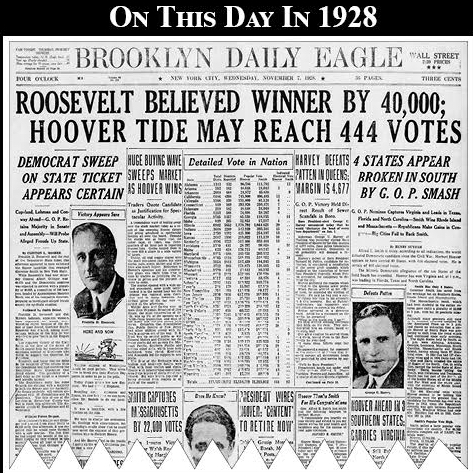November 7, ON THIS DAY in 1928, Herbert Hoover wins in landslide

ON THIS DAY IN 1928, the Brooklyn Daily Eagle reported, “Alfred E. Smith is today, according to all indications, the worst defeated Democratic candidate since the Civil War. Herbert Hoover appears to have carried 40 states, with 444 electoral votes. He is certain of 406 electoral votes. The historic Democratic allegiance of the ten States of the Solid South has crumbled. Hoover has won Virginia and, at 1 p.m., was leading in Florida, Texas and North Carolina … [Gubernatorial nominee] Franklin D. Roosevelt and the rest of the Democratic state ticket this afternoon appeared to have withstood the Hoover landslide that swamped Gov. Smith in New York state.” It was also reported, “New York state’s first woman member of Congress will be Mrs. Ruth Pratt, at present a member of the New York City Board of Aldermen. With one district missing at 3 a.m. today, Mrs. Pratt, a Republican, had 36,140 votes in the 17th District, while [her opponent had] 32,697.”
***
ON THIS DAY IN 1844, the Brooklyn Daily Eagle reported, “It has been frequently stated that New York was destined to prove the great battleground; and at this present writing, the truth of the assertion is abundantly manifest. The vote will be closer than anyone imagined, and the majority for [James K.] Polk a great deal less than we had a right to suppose. In fact, last night, and up to seven o’clock or eight o’clock this morning, the result was considered doubtful; but the returns furnished by the six o’clock boat from Albany are calculated, as we think, to remove all cause of alarm. If the Whigs do not cross Cayuga Bridge with more than 9,000, the State is safe for Democracy, beyond the shadow of a doubt. But if, by intrigue, forgery, or other Whig appliances, it should be carried up to eleven or twelve thousand, we shall begin to ‘fear and tremble.’”

Brooklyn Boro
View MoreNew York City’s most populous borough, Brooklyn, is home to nearly 2.6 million residents. If Brooklyn were an independent city it would be the fourth largest city in the United States. While Brooklyn has become the epitome of ‘cool and hip’ in recent years, for those that were born here, raised families here and improved communities over the years, Brooklyn has never been ‘uncool’.